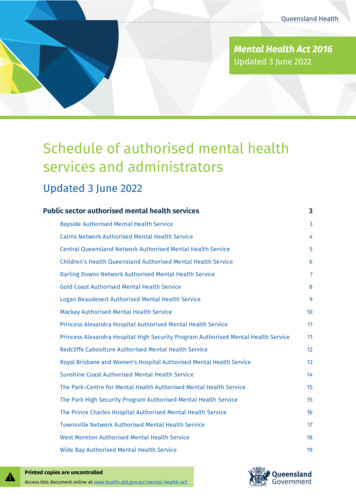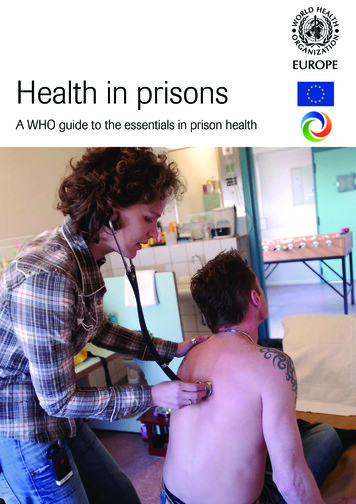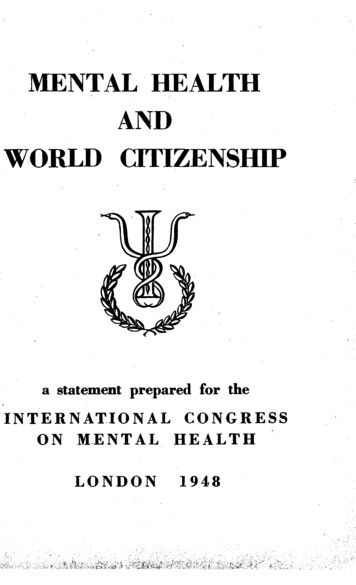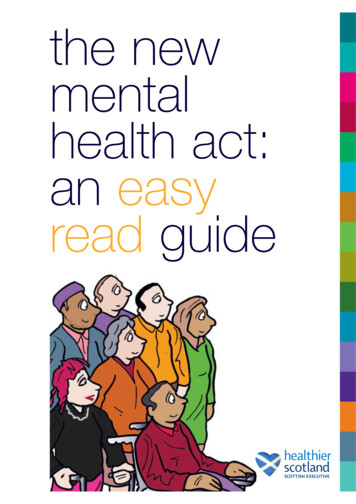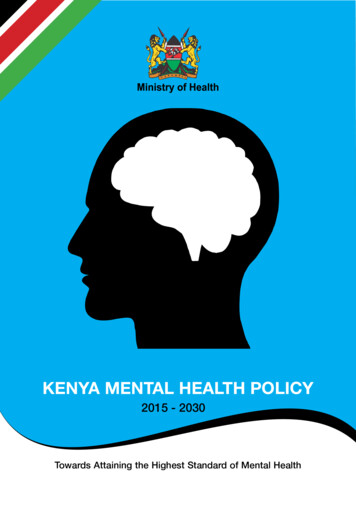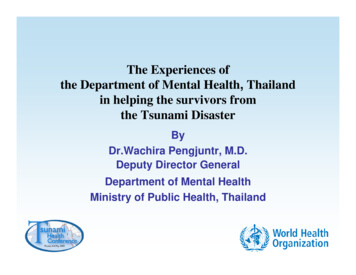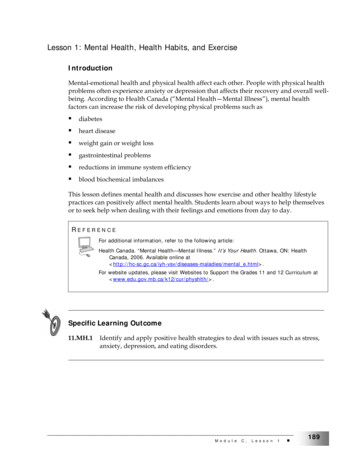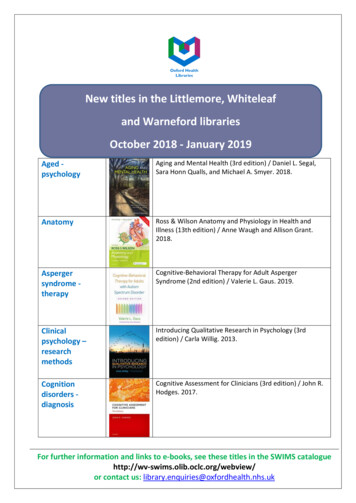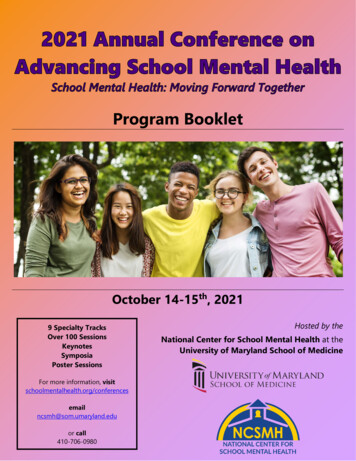
Transcription
Program BookletOctober 14-15th, 20219 Specialty TracksOver 100 SessionsKeynotesSymposiaPoster SessionsFor more information, som.umaryland.eduor call410-706-0980Hosted by theNational Center for School Mental Health at theUniversity of Maryland School of Medicine
CONFERENCE OBJECTIVESAt the end of the conference, attendees will be able to:1. Identify three strategies for effectively implementing a full continuum of integrated schoolmental health approaches to support students’ academic, behavioral, and social-emotionalsuccess.2. List three evidence-based practices in school mental health.3. Identify three action steps to meaningfully partner with youth and families in school mental health.SPECIALTY TRACKS1) School Climate, Social Emotional Learning, andMental Health Promotion (Tier 1)This track focuses on mental health promotion servicesand supports (Tier 1), social emotional learning, andschool climate. These include mental health-relatedactivities, such as the promotion of positive social,emotional, and behavioral skills and wellness that aredesigned to meet the needs of all students, regardlessof whether or not they are at risk for mental healthproblems. These activities can be implemented schoolwide, at the grade level, and/or at the classroom level.This track also focuses on policies and practices topromote positive school climate by fostering safety;promoting a supportive academic, disciplinary, andphysical environment; and encouraging andmaintaining respectful, trusting, and caringrelationships throughout the school community.2) Prevention and Early Intervention (Tier 2)This track focuses on selective services and supports (Tier 2) to prevent mental health and substanceuse concerns for groups of students who have been systematically identified through referral, needsassessments and/or school teaming processes as being at risk for a given concern or problem. Whenstudent needs are identified and supported early on, problems can be eliminated or reduced, andstudent success is promoted. Sometimes these are referred to as mental health prevention orsecondary prevention services.3) Mental Health Intervention and Treatment (Tier 3)This track focuses on indicated and individualized services and supports (Tier 3) to address mentalhealth and substance use concerns to meet the unique needs of each student who is displaying aparticular concern and significant functional impairment. Sometimes these supports are referred to asmental health intervention, treatment, tertiary services, or intensive services.1
4) Implementation Science and PracticeThis track focuses on frameworks, strategies, and methods that support successful implementation ofevidence-based services and supports in schools, especially as they relate to a multi-tiered system ofstudent mental health supports and services (MTSS). Implementation frameworks, strategies, andmethods can be applied to support the adoption, installation, ongoing implementation, andsustainability of practices in the “real world.” This includes the internal and external factors thatinfluence the implementation of evidence-based school mental health services and supports.5) Education-Mental Health Integration and CollaborationThis track focuses on the active exchange of ideas and collaborative engagement betweenschool-employed and community-employed mental health providers, educators, and families.This track addresses how to develop and implement a culture of collaboration between mentalhealth providers and educators to achieve shared outcomes for students and schools throughresearch, policy, and practice. It includes content that equips and empowers educators in theirroles as promoters of student mental health (e.g. educator training in mental health) and mentalhealth staff to work effectively in schools.6) Youth and Family Partnerships in Mental HealthThis track focuses on youth- and family-centered principles with leadership from students andtheir family members. This track emphasizes a connection to meaningful youth and familypartnership in all aspects (e.g., planning, development, implementation, evaluation, training) ofcomprehensive school mental health services and supports.7) Cultural Responsiveness and EquityThis track focuses on practice, theory, and research specific to culturally-diverse youth in schools.Specific issues such as stigma, cultural adaptations of evidence-based practices, reducing healthdisparities and disproportionality, meaningful family partnership, and cultural competence areconsidered in this track.8) Advocacy and PolicyThis track focuses on the development and advancement of school mental health legislationand policy at the school, district, state, and federal levels, including practical strategies andexamples of success.9) Financing and SustainabilityThis track focuses on the financial and non-financial dimensions of maintaining or supportingschool mental health services and supports over time, in which operational structures andcapacity are sound and can evolve and adapt to match the changing needs of students,families, schools, communities, and other systems in their context. This track considersfunding, resources, and policies that promote sustainable school mental health.2
CONFERENCE AGENDAThursday, October 14th 2021 Day 1 12:00 – 6:00 PM come and NCSMH UpdatesKeynote AddressBreakConference Session 1 (9 Conference Sessions)BreakConference Session 2 (9 Conference Sessions)BreakConference Session 3 (9 Conference Sessions)BreakPoster SessionsFriday, October 15th 2021 Day 2 12:00 – 5:00 PM 2:25-2:352:35-3:353:35-3:453:45-5:00WelcomeKeynote PanelAwardsBreakConference Session 4 (8 Conference Sessions)BreakConference Session 5 (9 Conference Sessions)BreakSymposia Sessions3
THURSDAY, OCTOBER 14th DAY ONE12:00-12:15Welcome and NCSMH Updates12:15-1:15Keynote AddressSharon Hoover, PhD and Nancy Lever, PhD, Co-Directors, National Center forSchool Mental Health at the University of Maryland School of Medicine, Baltimore,MDOvercoming the Collective Trauma of the Pandemic: Creating HealingCentered, Safe, Supportive, and Equitable SchoolsJoyce Dorado, PhD, Director and Co-Founder, UCSF HEARTS (Healthy Environmentsand Response to Trauma in Schools); Clinical Professor, Department of Psychiatryand Behavioral Sciences; University of California San Francisco at Zuckerberg SanFrancisco General HospitalFor most people, the coronavirus pandemic has been experienced as a collectivetrauma, with people of color and socioeconomically disadvantaged people(children, families, and adults) disproportionately bearing the pandemic’s adverseeffects. This keynote will outline trauma-informed, equity-promoting approachesthat can support schools to be places of healing, resilience, and equity forstudents as well as for the adults who serve and care for them.Conference Session 1 1:25-2:25 PMCS 1.01 Placing Equity at the Center of Mental Health Promotion in SchoolsSuzanne Button, PhD, Wenimo Okoya, EdD, The Jed FoundationTrack: Cultural Responsiveness & EquityIn order to address complex and critical issues of equity in programs that promote mental health in schools,implementors and schools must place equity at the center of change efforts. In our JED High School technicalassistance model, we drive change efforts with an equity frame. This presentation will outline equitableimplementation strategies, learnings from our first cohort year, and preliminary data on the students we arehoping to support.CS 1.02 Transformational Relationships: Centering Culture and IdentitySonya Benavides, MSW, PPSC, Seneca Family of AgenciesTrack: Cultural Responsiveness & EquityEquity in schools requires teams to reflect on whether their personal practice promotes a sense of belongingfor all youth. This work requires practitioners to engage in deeper discourse around identity harm and theimpact social ecological factors can have. Participants will explore frameworks to promote healing through thecreation of transformational relationships; and learn from the experiences of those in the field who havedestigmatized discussions about race, culture and identity.CS 1.03 Partnering To Co-Design Interventions: A Positive Psychology Case ExampleEmily Barry, MEd, Sarah Fefer, PhD, University of Massachusetts Amherst, Shannon Suldo, PhD, University ofSouth Florida , Kaylee DeFelice, BS, Elizabeth Rice, BA, Zachary Bath, BA, University of Massachusetts Amherst4
Track: Education-Mental Health Integration & CollaborationHow can researchers and school-based mental health providers collaborate to implement interventionsmatched to schools’ unique contexts? Through co-design! This presentation will highlight a case example ofone school’s mission to support their students’ complete mental health during a global pandemic. The schoolactively collaborated with a university-based research team to co-design delivery and evaluation of an existingpositive psychology intervention during the context of remote learning.CS 1.04 SHAPE UP New York: Piloting A State-Wide Learning CollaborativeMelissa Heatly, PhD, University of Rochester Medical Center, Angela Keller, MSW, NYS Office of Mental HealthJessica Stanic, MSW, MPA, NYS Office of Mental Health, Claire Criscione, BA, NYS Office of Mental HealthTrack: Implementation Science and PracticePresenters will discuss pilot implementation of SHAPE Up New York, a learning collaborative focused onadvancing the quality of school mental health systems across New York State. We will discuss strategies forbuilding statewide capacity for advancing the quality of NYS's Comprehensive School Mental Health Systems(CSMHS) using the SHAPE System, the National School Mental Health Curriculum, and Quality Improvementcycles. We will also discuss how this initiative met needs related to COVID-19 and share exemplar resourcesfrom across NYS.CS 1.05 District-wide Mental Health Screening: Six Years of ImplementationJohn Crocker, MEd, Methuen PS, MASMHCTrack: School Climate and Universal Mental Health Promotion (Tier 1)Presenters will provide a 6-year overview of how mental health screening was piloted, tested, and scaled-upacross Methuen Public Schools. Practical strategies that have yielded successful implementation of mentalhealth screening will be offered to attendees, including the use of web-based screening and adoption of apassive consent policy. The use of data to 1) identify students who may require services, 2) aid in progressmonitoring, and 3) evaluate program efficacy will also be discussed.CS 1.06 Youth Aware of Mental Health Adapted for Hybrid Tier 1 Classroom DeliveryJacqueline Anderson, PhD, Jennifer Hughes, PhD, MPH, UT SouthwesternTrack: School Climate and Universal Mental Health Promotion (Tier 1)The pandemic led schools to quickly adapt their mental health programming and academic instruction. OneTier 1 program that was adapted was Youth Aware of Mental Health from an in-person to hybrid delivery. Fromthe feedback of the students, they reported that they were satisfied, found it helpful, and would make nochanges. These adaptations made to the program can inform considerations for future models and hybriddelivery approaches.CS 1.07 Teacher Interpretation & Application of Behavioral Data throughout RTIColleen Bemonte, PhD, Judith Harrison, PhD, Rutgers UniversityTrack Name Prevention and Early Intervention (Tier 2)This presentation will describe the results of a study in which we evaluated pre-service and in-service teachers’ability, confidence, willingness, and perceived usefulness to interpret and apply behavioral data before andafter training. Participants will learn the results of the study and how to implement the “Collecting, Interpreting,and Applying Graphed Behavioral Data” training.5
CS 1.08 Design and Implementation of an Educator Therapy ProgramMegan Mccormick, PhD, Megan Polanin, PhD, Liz Demeusy, PhD, Micheal Brachfeld, PhD, Denisha Carter, PsyD,MedStar Georgetown Center for Wellbeing in School Environments (WISE), Sameet Ashfaq, MS, The ChicagoSchool of Professional PsychologyTrack: Mental Health Intervention and Treatment (Tier 3)The health of teachers has a profound impact on classroom climate and student functioning. The currentsession will highlight teacher mental health concerns and barriers to engagement in care, describe anintegrated educator therapy program, present preliminary data from ongoing program evaluation, and providestrategies for leveraging internal and community-based resources to better meet the mental health needs ofteachers and administrators.CS 1.09 Increasing Parent Consumer Behavioral Intentions for Evidence-Based CareSpencer Choy, MA, Marina Matsui, BA, Brad Nakamura, PhD, University of Hawai‘i at MānoaTrack: Youth and Family PartnershipsPrior to our work presented here, parent-report measurement about behavioral intentions for engaging inevidence-based services was non-existent, but our innovative Parent Engagement in Evidence-Based Services(PEEBS) was developed and tested with a large sample of diverse parents. Our findings supported five reliableand valid dimensions of parent behavioral intentions in this area. We gladly and freely offer the PEEBS tosupport your schools, providers, families, and students.2:25-2:35 PMBreakConference Session 2 2:35-3:35 PMCS 2.01 Students With Mental Health Challenges From COVID-19: School Nurse’s RoleCynthia Samuel, PhD, RN,CSN, Irvington Board of EducationTrack: School Climate and Universal Mental Health Promotion (Tier 1)This presentation discusses the school nurse’s role with students having mental health challenges from COVID19. These behaviors lead to a stressful environment at home, and in school leaving parents and teachersfrustrated. Focus is on developing strategies for effective learning, health, and well-being. School Nurses areable to collaborate with their districts, and community resources coordinating interventions meeting academicand cultural needs of students and families.CS 2.02 Where is the Equity? Teacher Perspectives on Student Wellness in COVID-19Tasha Childs, MSW, University of South Carolina, Elizabeth Brown, PhD, George Mason University, Kate Philippo,PhD, Loyola University Chicago, Naomi Brown, MSW, George Mason University, Aidyn Iachini, PhD, University ofSouth Carolina, Linda Galib, MPH, Loyola University ChicagoTrack: Education-Mental Health Integration & CollaborationThis presentation will share findings from a national survey of current P-12 US teachers. We will identifyresources that teachers access for school-based mental health services and highlight findings from this mixedmethod study that explores student wellness needs and teachers’ perceptions of needed resources (e.g.,professionals, services, interventions) across school characteristics. Implications for research and practiceregarding student wellness will be shared.CS 2.03 School Mental Health During the Pandemic: What We Can Bring ForwardLouise Fink, PhD, Baltimore City Public Schools, Ashley Collins, MPH, Baltimore City Public Schools, Nikira Epps,MPH, Behavioral Health System Baltimore6
Track: Financing and SustainabilitySchool mental health during the Pandemic brought forth innovation we can bring forward. To inspire healthiercommunities, it is imperative to connect people with innovative and quality services now while strategizingfuture improvement reflective of environmental, social, economic and industry constraints. Expanded SchoolBehavioral Health program, in it's 34th year, utilizes unique funding systems and effective evaluation toolscontinually evolving to meet the needs of students and families.CS 2.04 Classroom WISE: Mental Health Literacy Training Package for EducatorsJessica Gonzalez, MSW, Mental Health Technology Transfer Center (MHTTC) Network Coordinating Office Stanford University, Heather Gotham, PhD, Mental Health Technology Transfer Center (MHTTC) NetworkCoordinating Office - Stanford University, Shannon Nemer, PhD, West Ed, Nancy Lever, PhD, Sharon Hoover, PhD,National Center for School Mental Health - University of Maryland School of MedicineTrack: School Climate and Universal Mental Health Promotion (Tier 1)Educators and school personnel play a vital role in identifying and responding to mental health needs. TheMental Health Technology Transfer Center (MHTTC) Network and the National Center for School Mental Healthdeveloped Classroom WISE (Well-Being Information and Strategies for Educators), a free 3-part package(online course, video series, website) focused on educator mental health literacy. This session will demonstrateClassroom WISE and present evaluation results.CS 2.05 Examining School-Based Mental Health Supports for Students in Foster CareJacqueline D'Angelo, PhD, Alex Trout, PhD, Academy for Child and Family Well BeingTrack: School Climate and Universal Mental Health Promotion (Tier 1)Students in foster care experience high rates of mental health disorders, which negatively impacts schoolsuccess. We will share findings from a national survey of educational professionals (N 550) examining thedegree to which schools are equipped to support students involved in foster care and the perceivedimportance and availability of social, emotional, and mental health supports. Moreover, we examine theperceived challenges schools face in addressing the needs of students in foster care.CS 2.06 Restorative Practice and Health Protective Factors for Girls of ColorThalia González , JD, Rebecca Epstein, JD, GeorgeTown Law CenterTrack: School Climate and Universal Mental Health Promotion (Tier 1)Presenters will discuss findings from a national qualitative study that indicates positive associations betweenproactive restorative practices and health protective factors for Black and Latina middle and high school femalestudents. Key outcomes include increased school, peer and family connectedness, improved sense of safetyand school climate, and development of social-emotional skills. Though conducted prior to COVID, the resultshave significant implications for school reopening plans.CS 2.07 Supporting Teachers in Implementing SEL: Findings from The Character EffectAmy Kerr, MEd, Miami University, Allison Williams, PhD, Beech Acres Parenting Center, Amanda Meyer, BA,Miami University, Jaimi Cabrera, MSW, Anne Wallace, PhD, Beech Acres Parenting Center, Paul Flaspohler, PhD,Miami UniversityTrack: School Climate and Universal Mental Health Promotion (Tier 1)Panelists will present on efforts to evaluate the implementation and outcomes of The Character Effect, anemerging evidence-based SEL program focused on supporting teachers to support students. Presenters willshare results from a program evaluation; discuss how teacher support strategies can be linked with student SEL;outline specific strategies for supporting teacher well-being and efficacy; and discuss program flexibility acrossschool environments, including COVID virtual education.7
CS 2.08 Social-Emotional Learning & Mixed Reality Simulation as Tier 2 InterventionAmy Cook, PhD, Kristen Murphy, PhD, Lindsay Fallon, PhD, Anastasiia Lun, MA, Anna Whitehouse, University ofMassachusetts BostonTrack: Prevention and Early Intervention (Tier 2)This presentation describes a social-emotional learning (SEL) tier 2 intervention, Storybooks and Social Hooks(SASH), with K-5 children. SASH uses culturally responsive dialogic reading and role play, including mixedreality simulations (MRS), to support SEL. Our research findings showed statistically significant improvements inSEL skill display. Presenters will describe how to implement the SASH curriculum as a tier 2 intervention andhow to measure SEL skills using Direct Behavior Ratings.CS 2.09 Comparative Effectiveness of Models to Reduce Exclusionary DisciplineKristin Scardamalia, PhD, Cindy Shaeffer, PhD, Yourdanos Bekele, BA, University of Maryland School of Medicine,Kyle Longeway, MEd, Cecil County Public Schools, Christie Edelson, MED, Cecil County Public Schools, TorySaulsbury, MEd, Cecil County Public SchoolsTrack: Implementation Science and PracticePreliminary outcomes from a comparative effectiveness study of three models designed to reduce use ofexclusionary discipline practices will be presented: the School-Based Diversion Initiative (SBDI) with enhancedrestorative justice support; universal staff training in the Life Skills Crisis Intervention program (LSCI); and schoolresource officer mental health training (AMHT-SRO). School leaders will also provide insights on theimplementation support strategies that promote model success.3:35-3:45 PMBreakConference Session 3 3:45-4:45 PMCS 3.01 14 Ways School Boards Can Improve School Mental HealthJennifer Ulie-Wells, PhD, Please Pass the LoveTrack: Advocacy and PolicyComprehensive School Mental Health Systems build the foundations for schools to be able to create thrivingenvironments and develop sustainable supports. A school board is a vital partner to improve the mental healthof our students, staff, and families. As a school board member, Dr. Ulie-Wells will discuss critical mental healthtrends, what mental health looks like in school, concrete strategies every school board member needs to know,and resources.CS 3.02 Leveraging Rural Teachers’ Perspectives to Support Student Mental HealthLora Henderson, PhD, Amanda Nyugen, PhD, Catherine Bradshaw, PhD, University of VirginiaTrack: Cultural Responsiveness & EquityWe pull from several programs of research to identify the training and support that rural teachers need to beable to meet the mental health and social and emotional needs of their students, and then describeapproaches to teacher training and professional development specifically adapted for rural teachers. We willengage participants in a guided discussion around promising approaches to teacher-focused interventions thatcan also improve rural student wellbeing.CS 3.03 Nature vs. Nurture: Compassionate Engagement in EducationAmber Knighting, PhD, Virginia Tiered Systems of Support, Kelly Henderson, PhD, Formed Families ForwardTrack: Cultural Responsiveness & Equity8
In the absence of equivalent emotional states, humans are not innately compassionate beings. Yet, in aprofession such as Education, which functions to serve others, the ability to have a personal, emotional,spiritual and communal understanding of one another is critical. This session will explore the use ofTransformative Social Emotional Learning to conceptualize Diversity as an Asset and address the SystemicTrauma of Intersectionality within educational institutions.CS 3.04 Utilizing Intersectionality to Shift Practices and systemsChynna McCall, PhD, Missouri Prevention Science Institute, Monica Romero, MA, Educational, School &Counseling Psychology, University of Missouri, Wenxi Yang, MS, Educational, School & Counseling Psychology,University of Missouri, Tanya Weigand, MSW, School of Social Work, University of Missouri, Christa Copeland,PhD, Missouri Prevention Science InstituteTrack: Cultural Responsiveness & EquityPresenters will discuss a flow chart that illustrates the necessary steps for gaining an intersectional perspectivefor an individual. Along with the flow chart, activities that help to generate growth within the steps will also beprovided. To aid systems work, the system requirements outline will be provided. Along with that outlineactivities and prompts to help guide systems consultation discussions will also be provided. Worksheets thatcan help further a systems growth towards being an equitable environment.CS 3.05 Youth Voice 2020: Covid-19 & Social Emotional Wellness in Rural DistrictsHennessey Lustica, PhD, Sodus CSD, Rob Lillis, Evalumetrics ResearchTrack: Education-Mental Health Integration & CollaborationThis study was designed to examine the social emotional impact of rural school building closures on studentsin grades 4-12, during COVID-19 closures. We will share the results of the Youth Voice Survey 2020 (n 2,819)which indicated increased levels of social emotional distress and attachment to school and family as statisticallysignificant mitigating factors in this sample. We will share our student’s voices and our method fortransforming their voices into tangible MTSS interventions.CS 3.06 Development of a Tier 1 Mental Health Literacy Program (MHL) InventoryRosemary Reyes, BA, University of Washington School of Medicine; Psychiatry & Behavioral Sciences; SchoolMental Health Assessment, Research, and Training (SMART) Center; Eric Bruns, PhD, University of WashingtonSchool of Medicine; Psychiatry & Behavioral Sciences; School Mental Health Assessment, Research, and Training(SMART) Center; Casey Chandler, BA, University of Washington School of Medicine; Psychiatry & BehavioralSciences; School Mental Health Assessment, Research, and Training (SMART) Center, Todd Crooks, Chad's LegacyProject, Laura Crooks, MHA, Chad’s LegacyTrack: School Climate and Universal Mental Health Promotion (Tier 1)This session will present an effort by the SMART Center to develop an online program inventory of Tier 1school-based mental health literacy programs for high school students. A scoping review was used to identifyover 40 school-based MHL programs that met an established definition for mental health literacy. In thispresentation, we will discuss how MHL programs were reviewed & assessed for inclusion in our onlineinventory. Implementation best practices for MHL programs will be outlined. The presentation will also discusshow MHL programs can ensure cultural responsivity within schools. By providing culturally responsiveimplementation practices within MHL programs ensures that students from all cultural backgrounds are beingprovided adequate & appropriate mental health care in schools.CS 3.07 Virtual adaptation of a Tier-2 intervention with newcomer studentsMaisha Syeda, PhD, Claire Crooks, PhD, Alexandra Fortier, EdD, Ghina Kayssi, MA, Centre for School MentalHealth, Western University9
Track: Prevention and Early Intervention (Tier 2)The conference session presents on the adaptation of an evidence-informed, resilience-enhancing Tier-2school intervention for virtual delivery with newcomer students. We will highlight the trauma-informed andculturally responsive consideration that guided our adaptation process and describe the training and supportscreated for school mental health professionals to help them deliver the program online. Finally, we will providerecommendations to promote newcomer parental engagement.CS 3.08 Having Students Prevent Violence, Recognize Struggles, and Advance EquityCarolyn Curties, EdD, Fryeburg AcademyTrack: Youth and Family PartnershipsThis presentation focuses on the power of peers to improve the well-being of others and positively transformschool cultures. Participants will learn how students can prevent and reduce school violence, recognize andreduce peers’ mental health struggles, and advance issues of equity to make schools a safer and moresupportive place for all. Given the vast mental health struggles in youth, this session provides strategies to howto successfully have students help each other.CS 3.09 Integrating Trauma-Sensitive Schools and Social and Emotional LearningKathleen Guarino, LMHC, American Institutes for ResearchTrack: School Climate and Universal Mental Health Promotion (Tier 1)This session will examine how schoolwide trauma sensitivity and social and emotional learning can beintegrated and expanded to foster safe, supportive, and culturally responsive schools. Presenters will discusskey strategies for integration that include: developing a shared understanding and integrated vision; buildingreadiness; changing mindsets; supporting joint implementation; starting with the adults; and addressing robustequity.4:45-5:00 PMBreak10
Posters 5:00 – 6:00 PMCLUSTER ONE: Education-Mental Health Integration & Collaboration, Session ABuilding Capacity in Educators to Build Trauma-Informed Systems Elizabeth Demeusy, PhD, Medstar WISE;Megan Polanin, PhD, Medstar WISE; Denisha Carter, PhD, Medstar WISE; Sameet Ashfaq, BA, The Chicago School ofProfessional Psychology; Megan McCormick, PhD, Medstar WISETrack: Education-Mental Health Integration & CollaborationComing Back from COVID-19: Community-Building Circles for Educators Jessica Kusina, MA, University ofRochester Medicine; Melissa Castle Heatly, PhD, University of Rochester MedicineTrack: Education-Mental Health Integration & CollaborationTracking Teacher and Student Wellbeing Through COVID-19 Cambria Corsi, MEd, University of Utah; MaryHynes, MEd, University of UtahTrack: School Climate and Universal Mental Health Promotion (Tier 1)CLUSTER TWO: Education-Mental Health Integration & Collaboration, Session BA Review of Interdisciplinary Teams in School Mental Health Katelyn Wargel, MA, MPA, Miami University; PaulFlaspohler, PhD, Miami University; Jack Baker, MA, Miami University; Amy Kerr, MEd, Miami University; AmandaMeyer, BATrack: Education-Mental Health Integration & CollaborationEmpowered Voices High School Credit Course Offered by CBOs Ethan White, Boys & Girls Club of Malibu;Peggy Zherdev, MSW, MPP, Boys & Girls Club of Malibu; Violet Miekle, MA, Boys & Girls Club of Malibu; Sarah Ryan,MA, Boys & Girls Club of MalibuTrack: Education-Mental Health Integration & CollaborationTraining Educators to Address the Mental Health Needs of Students With IDD Stephanie Barbre, PhD, TexasTech University; Chinomso Ihenagwam, MEd, Texas Tech UniversityTrack: Education-Mental Health Integration & CollaborationEducator Perspectives on a Culturally-Responsive Pedagogical Training Jerica Knox, MS, North Carolina StateUniversityTrack: Cultural Responsiveness & EquityThe Intersection of Unconscious Bias and Discriminatory School Discipline Case Thomas, LSU Health SciencesCenter S
Program Booklet. October 14-15th, 2021 . Hosted by the . . MSW, MPA, NYS Office of Mental Health, Claire Criscione, BA, NYS Office of Mental Health . Jennifer Hughes, PhD, MPH, UT Southwestern . Track: School Climate and Universal Mental Health Promotion (Tier 1) The pandemic led schools to quickly adapt their mental health programming and .

